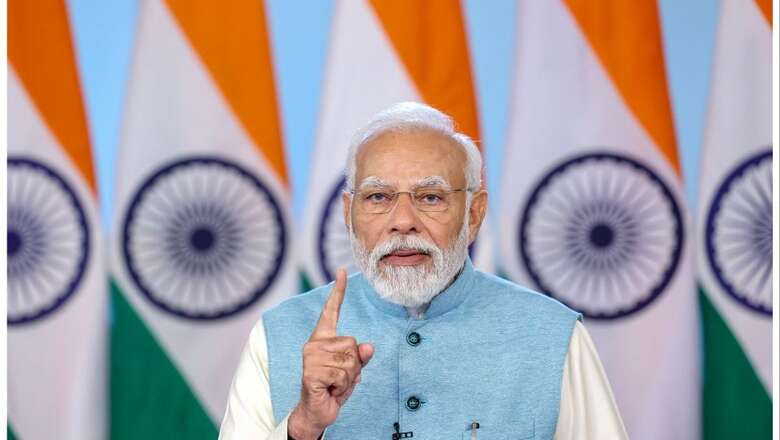
views
In recent years, the Department of Agriculture and Farmers Welfare, under the leadership of Prime Minister Narendra Modi, has been at the forefront of introducing transformative schemes and initiatives aimed at enhancing the well-being of farmers across the nation. These initiatives, marked by their comprehensive approach, reflect the government’s commitment to fostering sustainable agricultural practices, ensuring financial stability for farmers, and promoting overall rural development.
As the NDA government is nearing the completion of two terms, it is important to set the record straight on the persistent efforts of the Modi government to improve the standard of living of our farmers and to dispel all the myths to the contrary propagated by the disgruntled I.N.D.I. alliance. It is important to note that, as with other segments of our population, PM Modi’s government has made an extra effort to prioritise the needs of small and marginal farmers and provide them with a level-playing field. Some of these initiatives, like Drone Didi, are a visionary attempt to enable farmers to benefit from advanced technology.
Here is a quick peek into some of the most transformative schemes of the Modi government for farmers and how they have performed since being launched.
Pradhan Mantri Kisan Samman Nidhi (PM-KISAN)
PM-KISAN is a central sector scheme launched on February 24, 2019, to supplement the financial needs of landholding farmers, subject to exclusions. Under the scheme, financial benefits of Rs 6,000 per year are transferred in three equal four-monthly installments into the bank accounts of farmers’ families across the country through direct benefit transfer (DBT) mode. Till now, Rs 2.81 lakh crores have been transferred through direct benefit transfer (DBT) to more than 11 crore beneficiaries (farmers) through various instalments.
Pradhan Mantri Kisan Maan Dhan Yojana (PM-KMY)
To provide financial support and security to the most vulnerable farmer families, the government launched the Pradhan Mantri Kisan Maandhan Yojana w.e.f. September 12, 2019, to provide pension benefits to small and marginal farmers. PM KMY is meant for small and marginal farmers falling in the entry age range of 18 to 40 years and having cultivable land up to 2 hectares. The scheme seeks to provide a Rs 3,000 monthly pension to small and marginal farmers once they attain 60 years of age. As of now, the total number of farmers enrolled under the scheme is 23.38 lakh.
Pradhan Mantri Fasal Bima Yojana (PMFBY)
PMFBY was launched in 2016 to provide a simple and affordable crop insurance product to ensure comprehensive risk cover for crops for farmers against all non-preventable natural risks from pre-sowing to post-harvest and to provide an adequate claim amount. The scheme is demand-driven and available for all farmers. A total of 5,549.40 lakh farmer applications have been insured under the scheme since 2016–17. A total of Rs 150,589.10 crore has been paid as a claim.
Interest Subvention Scheme (ISS) & Kisan Credit Credit Card Saturation Drive
The Interest Subvention Scheme (ISS) provides concessional short-term agri-loans to farmers practicing crop husbandry and other allied activities like animal husbandry, dairying, and fisheries. ISS is available to farmers availing of short-term crop loans up to Rs 3 lakh at an interest rate of 7% per annum for one year. An additional 3% subvention is also given to the farmers for prompt and timely repayment of loans, thus reducing the effective rate of interest to 4% per annum. The benefit of ISS is also available for post-harvest loans against Negotiable Warehouse Receipts (NWRs) on crop loans for a further period of six months post-harvest to small and marginal farmers having Kisan Credit Cards (KCCs) on the occurrence of natural calamities and severe natural calamities. The KCC saturation drive was announced in 2020. As of October 20, 2023, 482.73 lakh new KCC applications have been sanctioned with a sanctioned credit limit of Rs. 547,819 crores as part of the drive.
Formation and Promotion of 10,000 Farmer Producer Organizations (FPOs)
The Government of India has launched the Central Sector Scheme (CSS) for “Formation and Promotion of 10,000 Farmer Producer Organisations (FPOs)” in the year 2020. Formation and promotion of FPOs are to be done through implementing agencies (IAs), which further engage cluster-based business organisations (CBBOs) to form and provide professional handholding support to FPOs for a period of five years, including the preparation and execution of business plans for the concerned FPOs to ensure better marketing opportunities and market linkages on a sustainable basis. As of October 31, 2023, a total of 7476 FPOs were registered under the scheme in the country.
Agriculture Infrastructure Fund (AIF)
To address the existing infrastructure gaps and mobilise investment in agriculture infrastructure, the Rs 1 lakh crore Agri Infra Fund was launched under Aatmanirbhar Bharat Abhiyan in 2020. The Agriculture Infrastructure Fund is a medium- and long-term debt financing facility for investment in viable projects for post-harvest management infrastructure and community farming assets through interest subvention and credit guarantee support. As of November 17, 2023, Rs. 32,042 crores have been sanctioned for 42,447 projects under the AIF. Out of this total sanctioned amount, Rs. 25,504 crore is covered under scheme benefits. These sanctioned projects have mobilised an investment of Rs 54,487 crore in the agriculture sector.
National Mission on Edible Oil-Oil Palm (NMEO-OP)
A new Centrally Sponsored Scheme, namely, the National Mission on Edible Oil (NMEO)-Oil Palm (NMEO-OP), has been launched by the Government of India to promote oil palm cultivation in the country of aatamnirbhar, with a special focus on the North-Eastern States and A&N Islands. The mission will bring an additional area of 6.5 lakh ha under oil palm plantations, with 3.28 lakh ha in north-eastern states and 3.22 lakh ha in the rest of India, in the next 5 years, from 2021–22 to 2025–26.
Minimum Support Price (MSP)
The government adopted the new MSP policy in 2018 based on the recommendation of the MS Swaminathan Commission. The government has increased the MSP for all mandated Kharif, Rabi, and other commercial crops with a return of at least 50% over the all-India weighted average cost of production from 2018–19. MSP for paddy (common) has increased to Rs 2,183 per quintal in 2023–24 from Rs 1,310 per quintal in 2013–14. MSP for wheat increased from Rs 1,400 per quintal in 2013–14 to Rs 2,125 per quintal in 2022–23.
International Year of Millets
Since the declaration of the International Year of Millets (IYM) 2023 by the UNGA in 2021, the government has taken a proactive multi-stakeholder engagement approach to achieve the aim of IYM 2023 and take Indian millets globally. To investigate the gaps and challenges across the millets value chain and the implementation of suitable solutions, six task forces were constituted. Also, 25 seed hubs have been established to ensure the availability of quality seed for the latest improved varieties of nutrient cereals in the country. Millet missions have been launched across 13 states, including Odisha, Tamil Nadu, Chhattisgarh, Assam, Karnataka, Madhya Pradesh, Maharashtra, Uttarakhand, Uttar Pradesh, Bihar, Himachal Pradesh, Gujarat, and Rajasthan. More than 500 start-ups and 350 FPOs have been established and are operational in the millet ecosystem as of now.
Promotion of Drone Technology in Agriculture
Looking into the unique advantages of drone technologies in agriculture, Standard Operating Procedures (SOPs) have been released. To make this technology affordable to the farmers and other stakeholders in this sector, financial assistance at 100% cost of the drone, together with the contingent expenditure, is provided for its demonstration on the farmers’ fields. So far, the amount of Rs 138.82 crore has been released towards Kisan drone promotion.
Namo Drone Didi
The government has recently approved a Central Sector Scheme for providing drones to the Women Self-Help Groups (SHGs) for the period from 2024–25 to 2025–26, with an outlay of Rs. 1261 crore. The scheme aims to provide drones to 14,500 selected Women Self-Help Groups (SHGs) for providing rental services to farmers for agriculture purposes (application of fertilisers and pesticides). Under this scheme, Central Financial Assistance at 80% of the cost of drones and accessories/ancillary charges up to a maximum of Rs 8.0 lakh will be provided to the women SHGs for the purchase of drones.
The Cluster Level Federations (CLFs) of SHGs may raise the balance amount (total cost of procurement minus subsidy) as a loan under the National Agriculture Infrastructure Financing Facility (AIF). An interest subvention of 3% on the AIF loan will be provided to the CLFs. The scheme will help infuse advanced technology in agriculture for improved efficiency, enhanced crop yield, and reduced cost of operation for the benefit of farmers. The scheme will also provide sustainable business and livelihood support to SHGs, and they will be able to earn additional income of at least Rs. 1.0 lakh per annum.
Agri Startups
Under the RKVY Agri-Startup Programme, since 2019-20, 1,259 start-ups have been selected, and Rs 83.67 crore has been released as grants-in-aid for funding these start-ups.
Agristack
It is a federated architecture for better planning, monitoring, policymaking, strategy formulation, and smooth implementation of schemes. AgriStack architecture has the mentioned foundational layers: Core registries, base databases, Farmers Database: Farmers ID linked with land records, geo-referencing of plots, crop survey, crop planning and soil mapping, soil fertility, unified farmers service interface for states, and data exchange.
Additionally, the National Beekeeping and Honey Mission (NBHM) and the National Mission on Natural Farming (NMF) have been set up to benefit farmers working in these sectors.
These initiatives collectively underscore the PM Modi-led government’s commitment to empowering farmers, promoting sustainable agricultural practices, and fostering rural development. As the Department of Agriculture and Farmers Welfare continues to innovate and implement progressive measures, the agriculture sector is poised for a transformative journey towards prosperity and resilience.
Reference link HERE
Tuhin A Sinha is a best-selling author and a national spokesperson of BJP; Sumit Kaushik is a PhD candidate at O.P. Jindal Global University and a social impact consultant. Views expressed in the above piece are personal and solely that of the author. They do not necessarily reflect News18’s views.


















Comments
0 comment